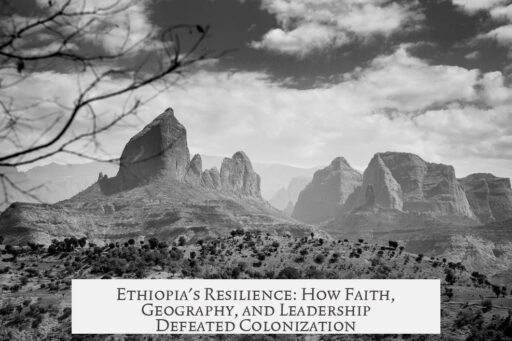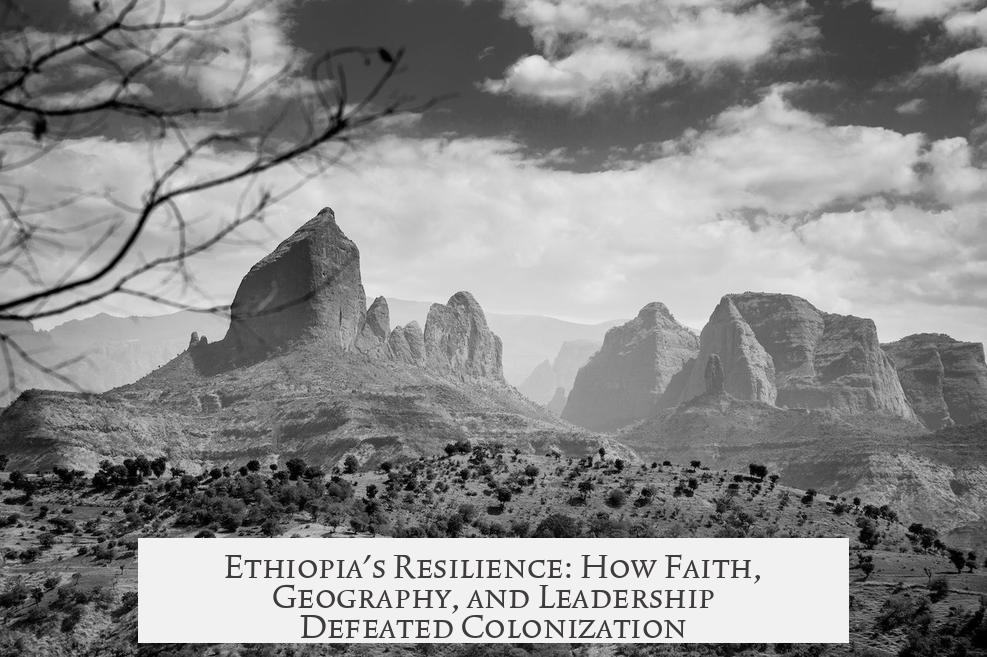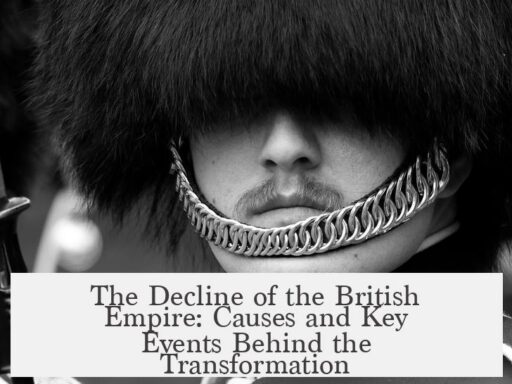Ethiopia successfully avoids colonization through a combination of religious identity, geography, political leadership, military strength, and diplomatic skill. These factors work together to maintain its sovereignty during the peak of European imperialism in Africa.
Ethiopia’s status as a Christian empire plays a key role. It is one of Africa’s few long-standing Christian nations. This identity fosters alliances with European Christian powers like Portugal and England. Such connections grant Ethiopia legitimacy and deter foreign powers intent on colonization. Having Christian rulers, such as the famed Prester John myth, adds symbolic weight that discourages colonial ambitions in a largely non-Christian continent. Ethiopia’s religious heritage helps position it as a stable, recognized state rather than a target for conquest.
The country’s geography strengthens its defense against colonization. Ethiopia lies inland with no direct coastline. European powers until the 19th century focus their efforts mainly on coastal regions for ease of access and trade. The rugged terrain, resembling grand canyons with dense vegetation, complicates large-scale military invasions. This natural fortification reduces practical incentives for colonial powers to launch prolonged campaigns. Periods of isolation from the 1600s to the 1800s further delay intense foreign interference.
Political developments consolidate Ethiopia’s ability to resist colonization. After a fragmented “Age of Princes” from 1755-1855, Emperor Tewodros II initiates centralization efforts. He curtails regional warlords, strengthening imperial authority. This unity discourages European powers from exploiting internal divisions to establish protectorates. British support to install Yohannes IV emphasizes European preference for a stable Ethiopian state as a counterweight to regional actors like French and Italians and as a buffer against Sudanese Mahdist forces. This strategic importance creates incentives for European respect of Ethiopia’s sovereignty.
Military resistance under Emperor Menelik II clinches Ethiopia’s freedom. Menelik modernizes the army with rifles and artillery, matching European weaponry. The 1896 Battle of Adwa is pivotal. Ethiopian forces decisively defeat Italian invaders. This victory secures international diplomatic recognition of Ethiopian independence. Menelik builds roads, invites technical advisors, and carefully balances foreign relations. He fosters ties with Russia to offset British influence, maintaining political autonomy without becoming a colonial client state.
European interventions typically aim at regional stability rather than outright conquest. When Emperor Tewodros II imprisons Europeans unhappily awaiting a British response, the British launch a punitive expedition. This expedition’s goal is limited retaliation, not colonization. The resulting provision of weaponry to Yohannes IV helps Ethiopia maintain order. Italian attempts to colonize become pronounced only later, with the 1935 invasion occurring decades after Ethiopia’s earlier resistance.
| Factor | Details | Impact on Avoiding Colonization |
|---|---|---|
| Religious & Cultural | Christian identity supports alliances with European powers. | Legitimacy and protection from colonial ambitions. |
| Geographical | Inland, rugged terrain, no coastline. | Difficult military access; less European interest pre-19th century. |
| Political & Leadership | Centralization by emperors Tewodros II and Menelik II. | Strong united leadership prevents internal exploitation. |
| Military Resistance | Modernized army; victory at Adwa 1896. | Discouraged European military conquest; forced diplomatic recognition. |
| Diplomatic Strategy | Balanced foreign relations, strategic buffer role. | Secures European respect of sovereignty and avoids client-state status. |
This multifaceted approach explains why Ethiopia stands out in African history as never fully colonized during the Scramble for Africa. Its Christian heritage builds early foreign ties. Its geography provides natural defense. Political reforms unify the nation. Military modernization delivers battlefield success. Skilled diplomacy exploits geopolitical rivalries, serving as a buffer state. Each element shapes Ethiopia into a resilient nation-state recognized and preserved by colonial powers striving for regional balance.
- Ethiopia’s Christian identity links it to European allies, deterring colonization.
- Geographic isolation and rugged terrain limit European invasion incentives and feasibility.
- Political unification under emperors prevents exploitation of internal divisions.
- Military victories, especially at Adwa, secure independence from colonial conquest.
- Diplomatic balancing acts prevent client state status and maintain sovereignty.
How Did Ethiopia Successfully Avoid Colonization?
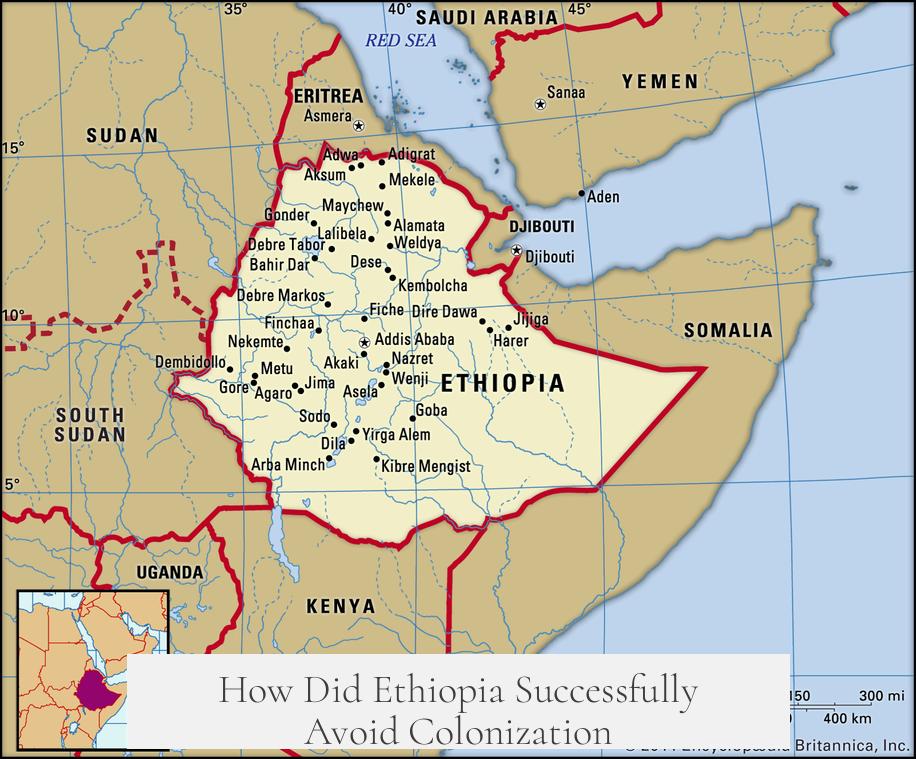
Ethiopia stands out in Africa for its remarkable success in avoiding full colonization during the Scramble for Africa. How exactly did this ancient kingdom manage to preserve its independence amid a sea of colonial conquests? The answer hinges on a mix of religious solidarity, unique geography, savvy political leadership, and military strength—all seasoned with a dash of timely diplomacy.
Let’s unravel this fascinating story piece by piece.
Religion and Cultural Identity: A Shield of Faith
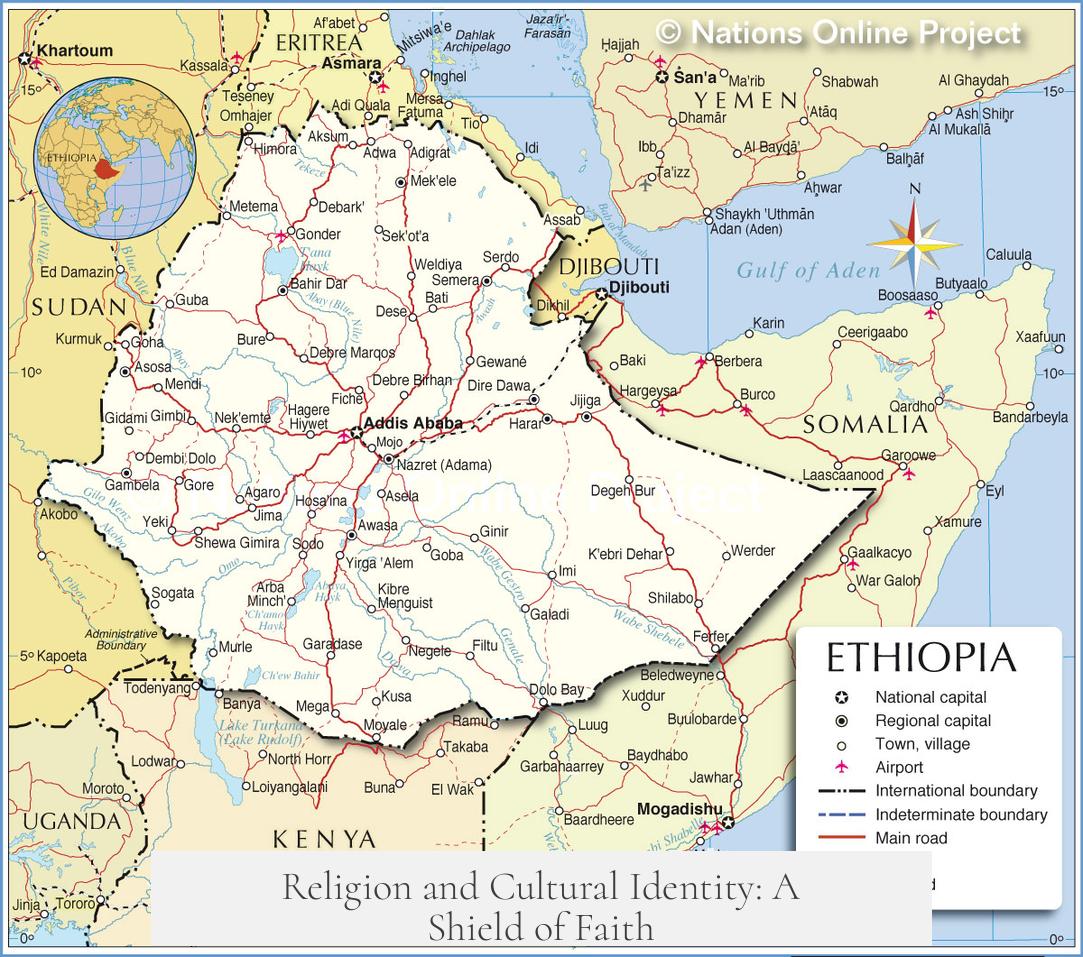
Ethiopia’s identity as a Christian nation plays a pivotal role in its story of resilience. Unlike many African regions, Ethiopia had a long-established Christian heritage dating back to antiquity. This religious alignment earned it a special place in the eyes of several European powers, including the Portuguese and the English.
Imagine being a Christian empire tucked deep in Africa during an era when European Christian kingdoms dominated global politics. Ethiopia’s rulers could claim kinship and shared values with these powers. The legendary tales of Prester John, a mythical Christian king often associated with Ethiopia, only reinforced this connection.
While other African states faced disregard or outright hostility, Ethiopia’s Christian status gained it a degree of respect and diplomatic cover. Colonial powers—particularly during the height of their territorial grabs—were more hesitant to dismantle a recognized Christian empire. They found in Ethiopia a stable Christian kingdom, not just an “exotic frontier,” tempering rushes to conquer.
The Geography Gambit: Nature as Fortress

Ethiopia’s geographical location is another key piece of the puzzle. This landlocked empire lies deep inland, shielded from the immediate ambitions of European powers who first sought coastal footholds.
Until the 19th century, Europe’s penetration into Africa was limited mostly to the coasts and river mouths. Ethiopia’s inaccessibility by sea meant it did not tempt explorers or imperialists during early colonial pushes.
Adding to its advantage is Ethiopia’s daunting terrain. Picture the country covered with steep highlands and rugged valleys—somewhat like an African Grand Canyon with lush greenery—a natural fortress few armies easily cross. This challenging terrain slowed down invading forces and gave Ethiopian defenders a home-field edge.
Thus, the land itself helped preserve Ethiopia’s sovereignty by discouraging and frustrating colonial expeditions.
Political Turbulence and Consolidation: From Princes to Power
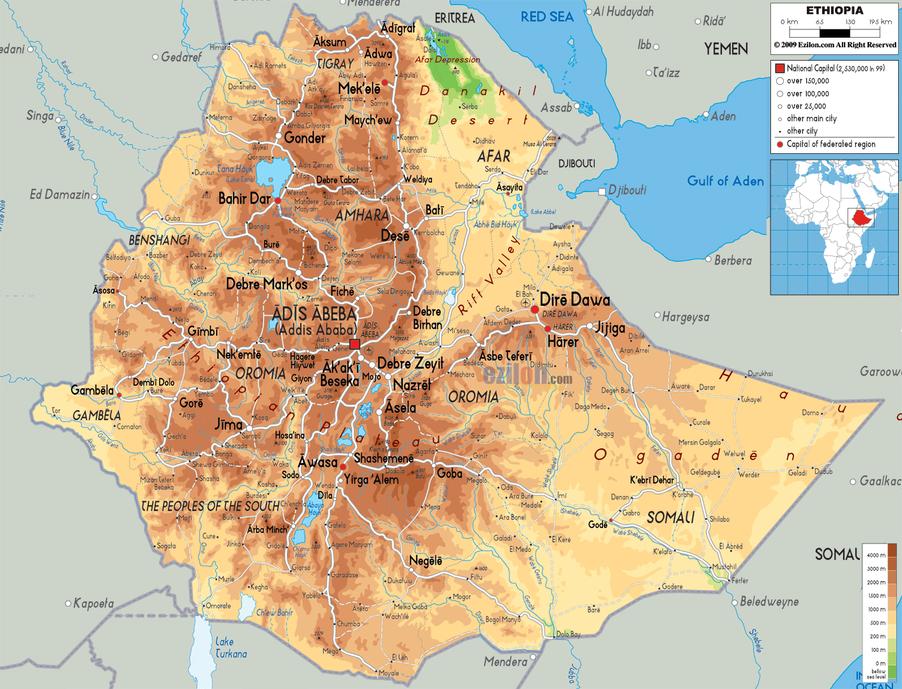
The story isn’t just about faith and geography though. Ethiopia endured a long period, roughly from 1755 to 1855, known as the “Era of the Princes”—a messy time when regional warlords battled endlessly, and emperors were mere figureheads. Sounds like a recipe colonial powers might exploit, right?
Indeed, if this chaos had continued, European powers might have easily backed rival princes to install puppet rulers. But this is where Emperor Tewodros II changes the game.
Beginning his reign in 1855, Tewodros II embarked on a mission to centralize power, unify the fractious nobility, and restore imperial authority. By eliminating warlords and consolidating power, he created a sturdy political core—not an easy feat in such a divided landscape.
A well-governed, centralized state is far less vulnerable to outside meddling. European colonialists prefer fragmented lands where they can pick winners and impose protectorates. Ethiopia’s newfound unity made this far less palatable.
In an interesting twist, Britain even intervened briefly to install Yohannes IV on the throne. But this intervention aimed more at regional stability and buffer zones—against rival European and local threats—than outright colonization.
Military Prowess and Diplomacy: The Menelik II Masterstroke
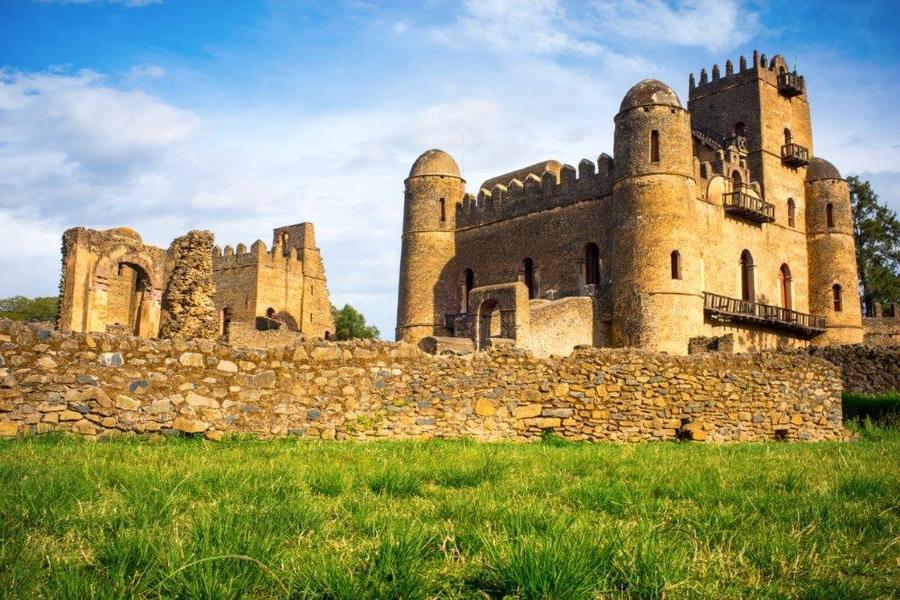
Fast forward to the reign of King Menelik II, Ethiopia’s finest chess player and war strategist. His crowning achievement was victory at the Battle of Adwa in 1896, a rare and shining moment where African forces defeated European invading armies.
Menelik II’s troops wielded modern rifles and artillery. His opponents? Italian forces with similar armament but unfamiliar with Ethiopia’s terrain and determination. The result was a decisive Ethiopian victory that stunned the colonial world and effectively secured Ethiopia’s sovereignty.
Following this, Menelik converted battlefield success into diplomatic wins. European colonial powers were forced to recognize Ethiopia’s independence formally. Menelik didn’t stop there.
He embraced selective modernization—building roads, inviting advisers and technicians to strengthen infrastructure and military capabilities. Importantly, he maintained Ethiopia’s autonomy by avoiding client-state dynamics with Britain, cleverly courting Russia as a counterbalance.
This balance of military resistance, effective diplomacy, and modernization helped Ethiopia not just survive but maintain stature on the international stage.
European Expeditions and Their Limited Impact

It’s tempting to think European expeditions always meant colonization, but Ethiopia’s case proves otherwise. Take Emperor Tewodros II’s conflict with Britain. When he imprisoned some British diplomats for ignoring his correspondence with Queen Victoria, Britain sent a punitive expedition.
The expedition ended tragically for Tewodros, who took his own life to avoid capture. But crucially, this mission sought punishment, not conquest, and ironically gifted subsequent Ethiopian rulers like Yohannes IV better weaponry.
While Italians did attempt to colonize Ethiopia, their efforts mostly failed until the invasion in 1935—decades after Ethiopia had solidified its sovereignty. Even then, the occupation met fierce resistance and only lasted a few years amidst global conflict.
What Can We Learn From Ethiopia’s Story?
- Religious and cultural identity can serve as a strong diplomatic shield.
- Geography matters: a challenging landscape can deter invaders and provide strategic advantages.
- Strong, centralized leadership prevents foreign powers from exploiting internal divisions.
- Military readiness and modernization are critical in matching imperial powers on equal footing.
- Diplomacy and strategic alliances safeguard independence against more powerful neighbors.
In essence, Ethiopia’s path to avoiding colonization is a testament to resilience, strategy, and the power of unity in the face of global imperial tides.
Ever Wondered…
Have you ever thought about how geography shapes history? Ethiopia’s rugged highlands didn’t just sculpt breathtaking landscapes—they crafted an impenetrable fortress against colonization. Could nature be the ultimate protector?
Or how might Ethiopia’s story inspire modern nations facing external pressures? Sometimes, the combination of cultural pride, clever diplomacy, and practical modernization paves the way to true independence.
Ethiopia’s legacy reminds us that history isn’t just about might; it’s about intelligence, identity, and integrity too.
